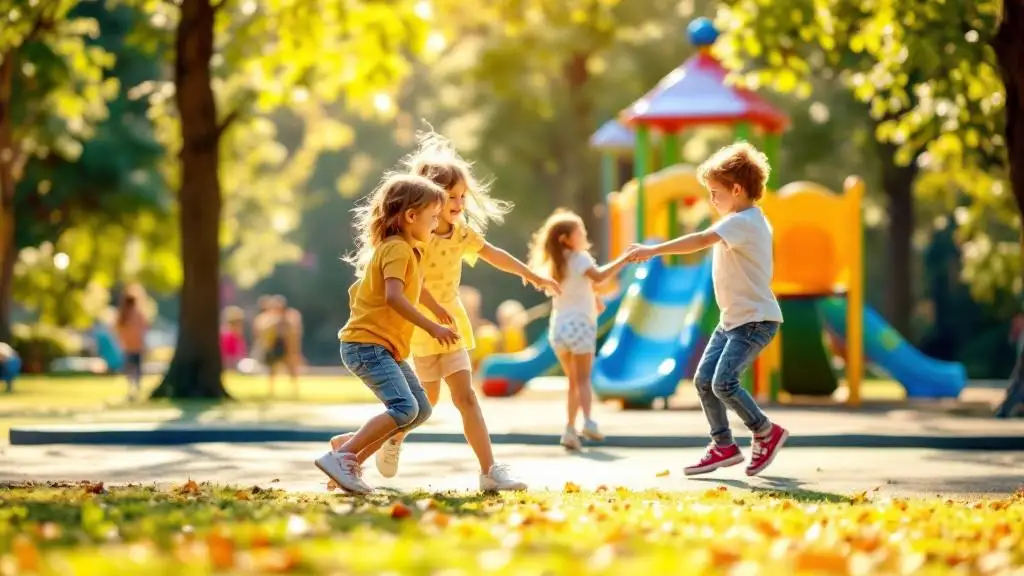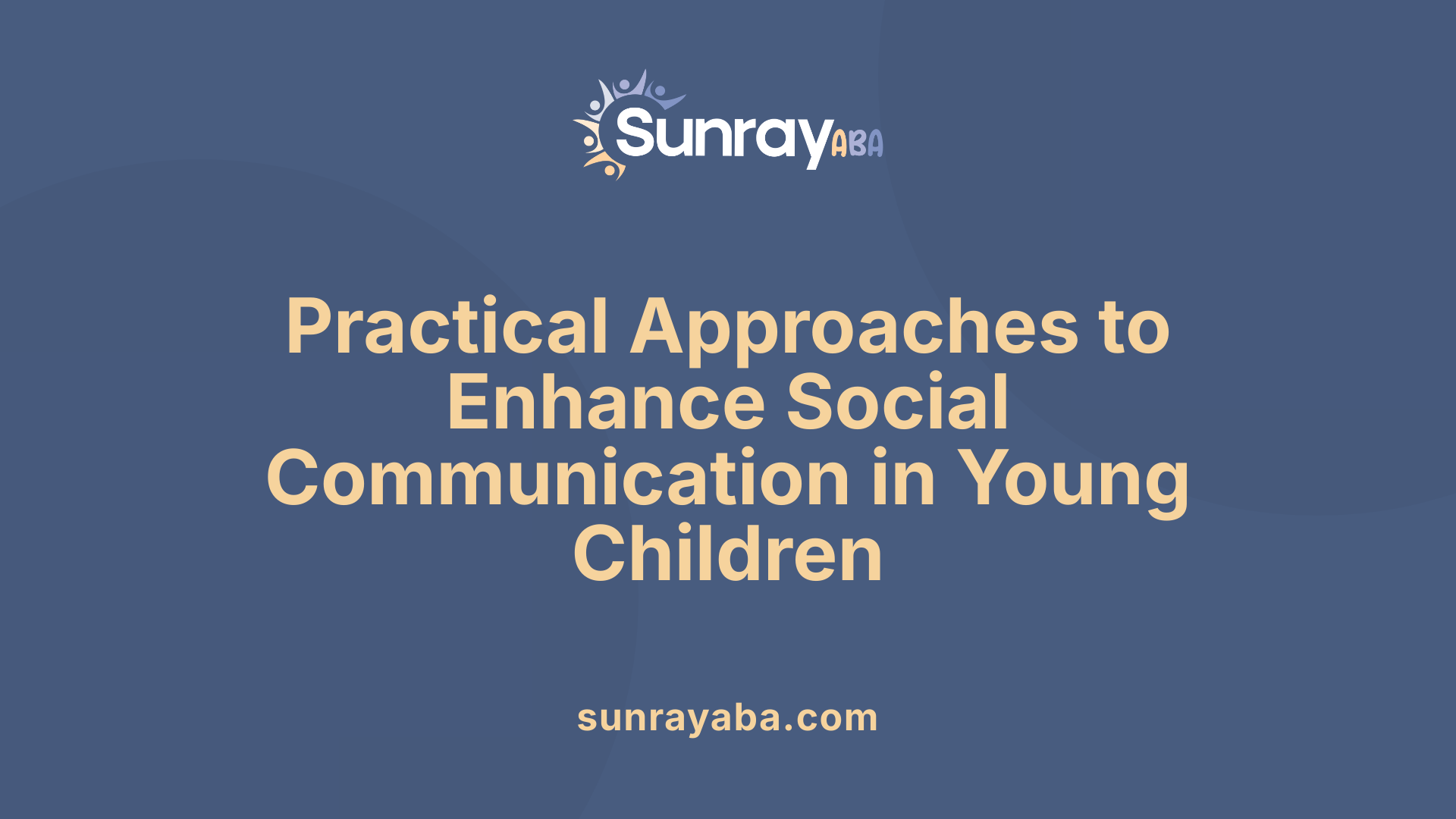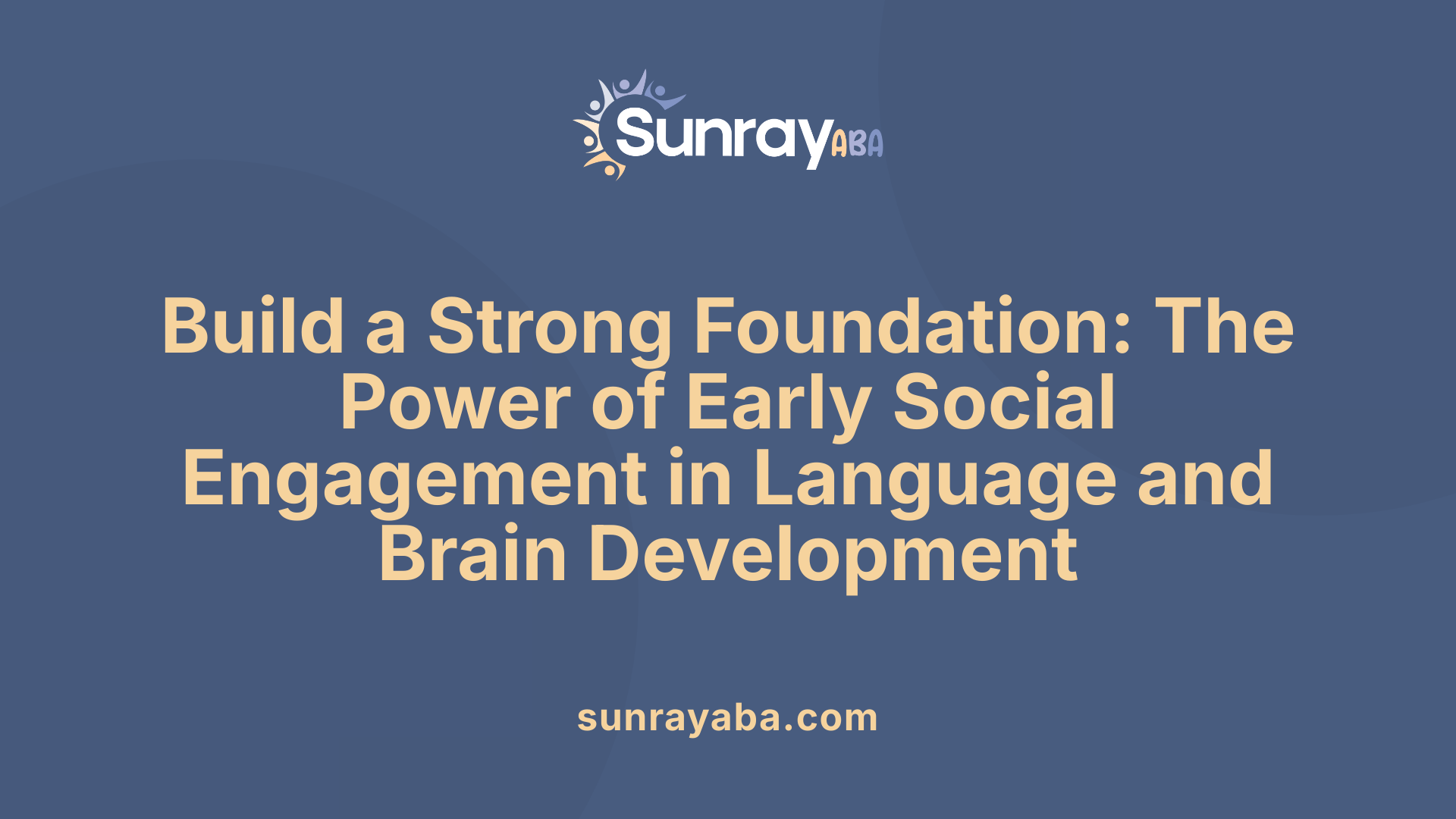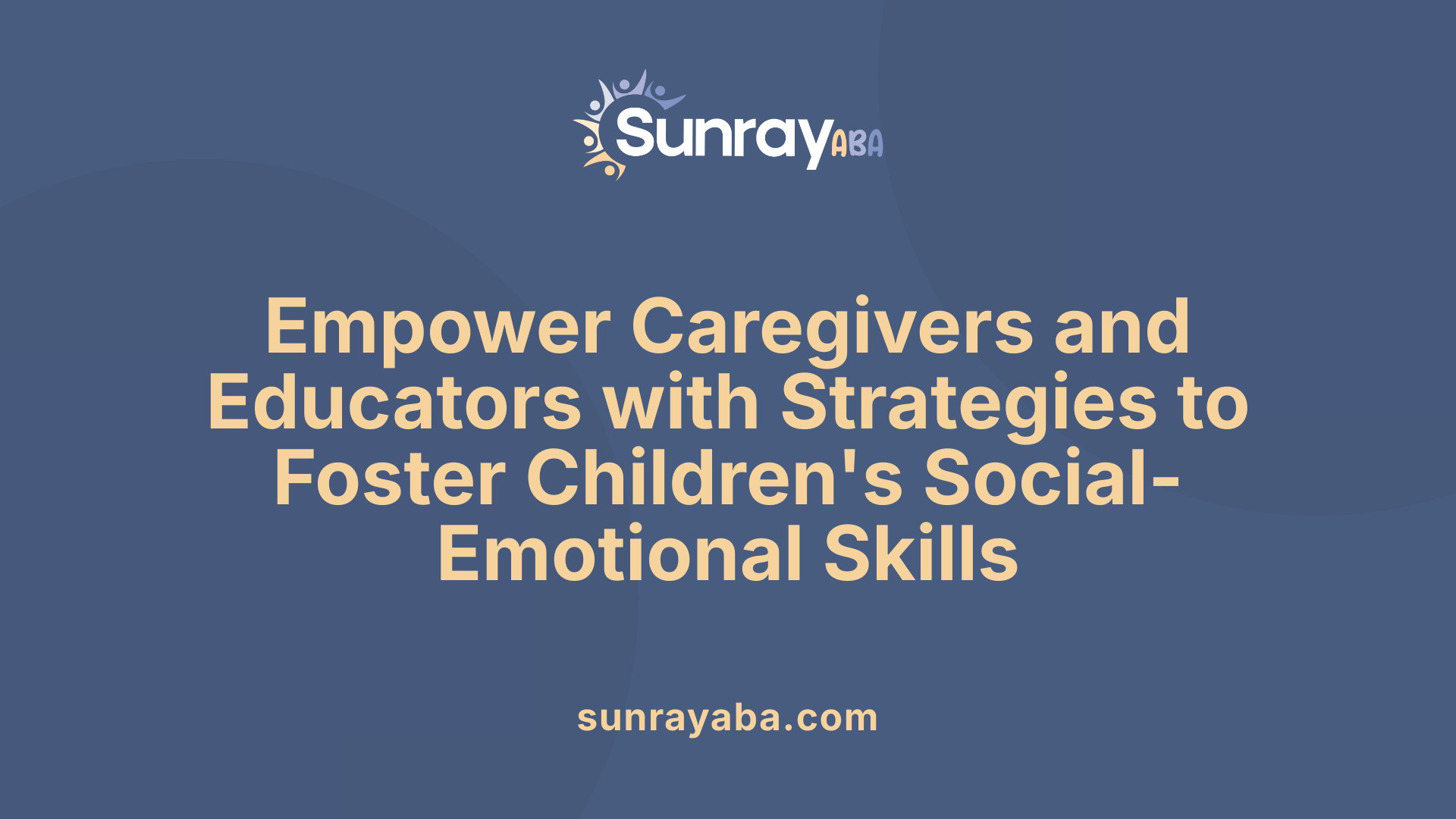The Importance Of Early Social Interaction For Development

Understanding the Link Between Social Interaction and Holistic Growth
Child development is a complex, dynamic process that encompasses emotional, cognitive, physical, and linguistic growth. Central to this process is early social interaction, which acts as a catalyst for nurturing well-rounded, resilient individuals. This article explores the profound importance of social engagement during the formative years, examining how relationships shape brain architecture, influence learning, and foster essential life skills. From infancy through early childhood, rich social experiences not only support immediate developmental milestones but also lay the groundwork for lifelong success and well-being.
The Significance of Early Social Interaction in Child Development

What is the significance of early social interaction for child development?
Early social interaction plays a crucial role in shaping a child's overall development. At its core, it helps children build confidence and develop social skills that are vital throughout their lives. Interacting with caregivers and peers teaches children how to communicate, share, take turns, and understand social cues, all foundational for forming healthy relationships.
Engaging children in intentional and structured activities, especially through play, enhances their emotional intelligence and social competence. Play-based experiences, using accessible materials and cooperative tasks, foster learning and emotional growth. These interactions are particularly important for children with developmental delays or disabilities, as they provide opportunities for inclusion and building trust.
Positive early social experiences contribute to better peer relationships, acceptance, and active participation in group settings like schools and community groups. Such participation promotes emotional well-being, reduces feelings of isolation, and encourages a sense of belonging.
Ultimately, nurturing rich and supportive social interactions during early childhood builds the foundation for success in later learning, emotional health, and behavioral development. These early connections are pivotal in helping children develop resilience, empathy, and social adaptability, crucial skills for navigating the complex social world.
How Social Interactions Drive a Child’s Emotional, Physical, and Cognitive Development

How do social interactions influence a child's emotional, physical, and cognitive growth?
Social interactions play a vital role in shaping a child's overall development. From infancy, engaging with caregivers through responsive interactions helps establish trust and emotional security, which are essential for resilience and healthy emotional regulation.
As children grow, play and peer relationships become critical for social skill development. Activities like sharing, taking turns, and cooperative play teach children how to communicate effectively, resolve conflicts, and build friendships. These experiences foster confidence and a positive self-image, laying the groundwork for future social competence.
On a neurological level, social engagement is key to building neural connections. During early childhood, these connections are formed most rapidly, supporting essential cognitive functions like problem-solving, attention control, and language development. The brain's plasticity means that positive social experiences can enhance learning capacity and adaptability.
In sum, social interactions support emotional security, promote physical well-being through active play, and advance cognitive abilities. Each interaction, whether through play, conversation, or shared experiences, contributes to a child's holistic growth and prepares them for healthy relationships and success in later life.
Early Social Skills and Their Impact on Future Success

What are the benefits of developing social skills early in childhood?
Developing social skills from a young age provides children with the tools needed to form positive relationships, communicate effectively, and show empathy and cooperation. These skills serve as the foundation for ongoing social, emotional, and cognitive development.
When children learn how to interact with others, they become better at resolving conflicts and building self-esteem. This confidence helps them navigate social situations more comfortably and establishes emotional resilience.
Early social development plays a significant role in school readiness. Children with strong social skills tend to transition smoothly into formal education, showing better participation, cooperation, and engagement in classroom activities. They are also more likely to perform well academically, as social competence supports concentration, problem-solving, and critical thinking.
Furthermore, children with well-developed social skills are more likely to succeed later in life, both professionally and personally. They tend to build healthier relationships, handle stress effectively, and demonstrate leadership qualities.
Research indicates that early social interactions contribute to better mental health outcomes, including lower levels of anxiety, depression, and behavioral issues. These skills are linked with increased resilience, enabling children to better cope with challenges and setbacks.
Investing in social skill development during early childhood thus has long-lasting benefits. It lays a strong groundwork for lifelong success, emotional well-being, and the ability to thrive in diverse social environments.
Practices and Strategies to Promote Social Communication and Skills

What methods and practices can be used to promote social skills and communication in young children?
Promoting social abilities and communication in early childhood involves engaging children in activities that foster interaction, understanding, and emotional expression. Creating a language-rich and socially stimulating environment is crucial. For example, incorporating role-playing games, group activities, and peer-led interactions encourages children to practice sharing, turn-taking, and cooperative behavior.
Visual aids such as social stories and pictures can help children grasp social norms and appropriate responses. These tools make abstract concepts more concrete and understandable, especially for children with communication difficulties.
Structured activities like social skills groups or cooperative projects are particularly effective. These settings allow children to learn social rules in a guided and supportive context while practicing their skills.
Emotional literacy plays a vital role in social development. Teaching children to identify, label, and discuss feelings promotes emotional regulation and empathy. Incorporating activities that involve active listening and discussing emotions helps children understand their own feelings and those of others.
Modeling desired behaviors is another powerful practice. When adults demonstrate respectful communication, kindness, and patience, children learn appropriate ways to interact. Consistent routines and responsive caregiving create a secure environment that supports healthy social-emotional growth.
Overall, these practices—when combined—lay down a strong foundation for effective social communication. They help children develop essential skills needed for building relationships, navigating social environments, and expressing themselves confidently.
The Role of Friendships and Social Connections in Skill Development

What is the role of social connection and friendships in the development of social skills?
Friendships are more than just a source of companionship; they are essential environments where children actively learn and hone vital social abilities. Through interactions with friends, children practice behaviors such as sharing toys, taking turns, listening attentively, expressing empathy, and resolving conflicts.
These peer relationships provide a safe space for children to try out new social behaviors and receive feedback, which helps them understand norms and expectations. Such experiences are fundamental in developing effective communication skills and emotional awareness. As children navigate friendships, they learn how to give and seek help, respond to others’ emotions, and negotiate social interactions.
Moreover, strong friendships significantly boost self-esteem and foster confidence. When children feel accepted and valued by their peers, they develop a positive sense of self and trust in their social abilities. This sense of belonging encourages further social exploration and skill development.
Through ongoing social connections, children also learn the importance of cooperation, kindness, and respect. These skills lay a solid foundation for future personal relationships and professional interactions in adulthood.
In summary, friendships serve as vital contexts for practicing social behaviors, increasing self-esteem, and enhancing emotional intelligence, all of which are crucial for lifelong social success.
| Aspect | Description | Example |
|---|---|---|
| Practice of social behaviors | Repeated peer interactions help children refine social skills | Sharing toys, resolving conflicts |
| Building self-esteem | Positive social experiences reinforce a child's confidence | Feeling accepted by friends |
| Emotional intelligence | Recognizing and responding to emotions improves social understanding | Comforting a sad friend |
More about the importance of friendships in child development
Understanding how friendships influence overall development highlights the importance of encouraging and facilitating peer interactions from an early age. Providing opportunities for children to build meaningful relationships supports emotional well-being, social competence, and future success in academic and personal life.
Early Social Interaction's Influence on Language and Executive Functions

How does early social interaction impact language development and executive functions?
Early social engagement is essential for building the foundational skills necessary for language and cognitive regulation in infants. When babies interact with caregivers through responsive exchanges, such as 'serve and return' activities, they develop crucial abilities like joint attention, turn-taking, and emotional understanding. These interactions help children learn to express themselves, follow social cues, and comprehend language more rapidly.
Research shows that disruptions in social interaction—whether due to environmental factors or sensory impairments like deafness—can delay language development and impair the growth of executive functions. For example, infants deprived of consistent social input may struggle with planning, self-control, and understanding others' intentions.
Executive functions, including working memory, cognitive flexibility, and inhibitory control, strengthen alongside language skills during early childhood. These skills allow children to adapt to new situations, follow rules, and regulate impulses, all of which are fostered through social interactions.
Overall, social interaction acts as a cultural tool, reinforcing neural connections that support language acquisition and self-regulation. This interconnected development forms the groundwork for later cognitive and emotional success.
| Aspect | Impact | Additional Details |
|---|---|---|
| Language Development | Accelerated through social cues, imitation, and feedback | Guides vocabulary, syntax, and conversation skills |
| Cognitive Regulation | Enhanced by early interactions that promote impulse control | Builds cognitive flexibility and problem-solving skills |
| Brain Development | Neural pathways are strengthened via responsive social touches | Especially vital in the first three years |
In conclusion, nurturing early social exchanges is vital for holistic development. It not only encourages language growth but also shapes the abilities involved in managing thoughts, emotions, and behaviors, securing a strong foundation for lifelong learning and adaptation.
The Impact of Rich Environments and Engaging Activities on Social Communication

Why are language-rich environments and engaging activities important for fostering social communication?
Creating spaces filled with language and opportunities for interaction significantly enhances children's social development. These environments serve as the "third teacher," offering continuous, natural contexts for children to hear, practice, and refine their language skills.
Language-rich settings include a variety of vocabulary, stories, labels, and literacy tools that introduce children to new words and concepts. When children engage with these materials through conversations, storytelling, and reading, their ability to express thoughts, ask questions, and understand others grows.
Interactive activities like role-playing, singing, and group discussions foster reciprocal exchanges that develop social skills such as sharing, taking turns, and empathy. These experiences help children learn social cues, emotions, and ways to communicate effectively within groups.
Inclusive participation is crucial. When all children, regardless of ability or background, have access to diverse resources and activities, they can build confidence and develop stronger social bonds. Thoughtfully designed environments encourage children to engage actively and respond to one another, whether in a game, a storytelling session, or collaborative project.
Research highlights that these practices support a foundation for successful social and emotional interactions both in early childhood and later in life. The environment's role in shaping social communication is essential, facilitating responsive, inclusive, and meaningful engagement among children.
Overall, investing in language-rich environments with engaging, interactive activities enriches children's social communication skills, laying the groundwork for healthy relationships and effective collaboration throughout their lives.
Supporting Caregivers and Educators: Strategies for Fostering Social-Emotional Development

What strategies can caregivers and educators use to facilitate social-emotional growth?
Caregivers and educators play a vital role in nurturing children’s social and emotional skills. One of the most effective approaches involves engaging in supportive and responsive interactions. These interactions, often described as 'serve and return,' help build trusting relationships and model positive social behaviors. When adults consistently respond to children’s cues with warmth and attention, children develop a sense of security that underpins their emotional resilience.
In addition to responsive interactions, providing diverse opportunities for play is crucial. Play-based learning encompasses cooperative activities, imaginative role-playing, outdoor adventures, and nature exploration. Such play settings allow children to practice important skills like sharing, taking turns, and empathizing with others. Through guided play, children learn to navigate social dynamics and develop emotional self-regulation.
Teaching children to recognize, label, and manage their feelings is another key strategy. Educators and parents can facilitate this through storytelling, emotion cards, and safe spaces where children feel comfortable expressing themselves. Introducing mindfulness practices and self-calming techniques helps children handle strong emotions, fostering emotional control.
Consistent routines and positive reinforcement create a predictable environment where children feel emotionally secure. Active listening and empathetic responses validate children’s feelings, further strengthening their ability to form healthy relationships.
Culturally responsive practices play an important role as well. Celebrating diverse backgrounds and incorporating culturally relevant stories and activities promote inclusivity and respect. This approach helps children feel valued and understood, which encourages open communication and social competence.
Overall, nurturing environments that emphasize respectful interactions, active engagement, and strong partnerships with families lay the foundation for ongoing social-emotional development. By integrating these strategies into daily routines, caregivers and educators support children’s growth into confident, empathetic, and emotionally intelligent individuals.
| Strategy | Description | Outcome |
|---|---|---|
| Responsive interactions | Engaging in supportive back-and-forth communication with children | Builds trust, emotional security |
| Play-based learning | Providing varied play opportunities like cooperative and imaginative play | Enhances social skills, empathy |
| Feelings education | Using stories, emotion cards, and discussions to recognize and work through emotions | Fosters emotional regulation |
| Mindfulness and self-calming | Introducing techniques for managing strong feelings | Improves self-control |
| Culturally responsive practices | Incorporating children’s cultural backgrounds into activities | Promotes inclusivity and respect |
By intentionally applying these strategies, caregivers and educators can create enriching environments that not only support early social-emotional skills but also lay the groundwork for lifelong well-being.
Scientific Research Supporting Early Social Experiences and Child Outcomes

What scientific insights and research findings support the importance of early social experiences?
Research in neuroscience and developmental psychology provides strong evidence that early social interactions are vital for healthy brain development. During the earliest years, particularly the first three years of life, the brain forms neural connections at an astonishing rate. It is during this sensitive period that social experiences—such as interactions with caregivers and peers—have a profound impact on shaping brain architecture.
Stimulating environments and responsive caregiving foster the development of neural pathways associated with language, emotional regulation, and social understanding. For example, the concept of 'serve and return', where a caregiver responds to a child's cues, supports neural growth and helps build communication and social skills.
Longitudinal studies have shown that children who experience positive early relationships and participate in high-quality early childhood programs tend to develop better emotional regulation, social competence, and cognitive abilities. These children are more likely to succeed academically, maintain healthier relationships, and exhibit resilience throughout life.
Conversely, early adversity—such as caregiver neglect or deprivation—can lead to structural brain changes, especially in areas like the amygdala, which is involved in processing emotions. These alterations can result in heightened emotional reactivity and difficulties in social interactions later in life.
Early intervention strategies, including targeted programs and therapies during critical periods, have demonstrated effectiveness in mitigating the impacts of adverse early experiences. They can promote resilience and normalize developmental trajectories.
In summary, scientific evidence underscores that enriching early social environments, along with responsive caregiving, not only supports immediate developmental needs but also sets a foundation for lifelong health, emotional well-being, and social competence.
Fostering Lifelong Social and Emotional Success
Investing in early social interactions and nurturing environments during childhood unlocks a wealth of developmental benefits. From supporting neural architecture to building essential social skills, these early experiences influence lifelong health, happiness, and success. By understanding the profound impact of social engagement, caregivers, educators, and policymakers can create strategies, programs, and policies that foster positive relationships, emotional resilience, and cognitive growth. As we prioritize early social development, we lay the groundwork for future generations to thrive in a diverse and interconnected world, emphasizing that the early years truly are the most critical for shaping a child's future.
References
- The importance of socializing children | BCM
- The Importance of Social Interaction in Child Development
- Social development in early childhood and how it can affect your kids
- Social Connection On Child Development - Children's Bureau
- Why Social Interaction is Important For Young Children
- Principles of Child Development and Learning and Implications That ...
- Why developing social skills is important for young children
- Interactions - Help for early years providers - Department for Education